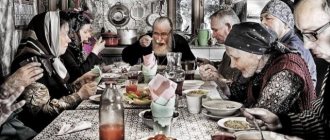All people are mortal - this is a consequence of committing original sin. But at the same time, all Christians know that the soul given by the Lord is immortal, and in the case of a righteous earthly life, it is destined for eternal life in the Kingdom of Heaven. But ordinary people remember this when they are on the verge of death. At this moment, many questions arise about where the soul goes after death, about how relatives can help it find peace. Knowing the answers to these questions, a person ceases to perceive death as a tragic event and more easily tolerates the loss of loved ones.
Stuck between worlds
Sometimes it happens that inexplicable things happen in the house: water starts flowing from a closed tap, a closet door opens by itself, something falls from a shelf, and much more. For most people, such events are quite frightening. Some people rather run to church, some even call the priest home, and some do not pay attention to what is happening at all.
Most likely, these are deceased relatives trying to get in touch with their relatives. Here we can say that the soul of the deceased is in the house and wants to say something to his loved ones. But before you find out why she came, you should find out what happens to her in the other world.
Most often, such visits are made by souls who are stuck between this world and the other world. Some souls do not even understand where they are and where they should move next. Such a soul strives to return to its physical body, but can no longer do this, so it “hangs” between two worlds.
Such a soul continues to be aware of everything, to think, it sees and hears living people, but now they can no longer see it. Such souls are usually called ghosts, or ghosts. It is difficult to say how long such a soul will remain in this world. This may last several days, or it may drag on for more than one century. Most often, ghosts need help. They need help to reach the Creator and finally find peace.
Correct Remembrance
Knowing that the soul of a person appears before God on the 9th and 40th day, the relatives of the deceased need to know how to properly remember the deceased relative - what can be done and what is strictly prohibited. It is necessary to treat the soul that is awaiting its fate with compassion, to lighten its burden, to help it. To do this you need to know:
- At a funeral, there is no need to fall to the coffin of the deceased or his grave with screams and sobs. By doing this, people do not understand that they are bringing even more torment and torment to the soul. It is better to grieve in thoughts, being in contrition and praying that God will be merciful to the soul that will soon see Him.
- Since the 9th day is the beginning of God’s path, and the 40th is its end, when the Lord determines the place where she will remain for eternity, at a wake you cannot curse a person, speak badly about him, or remember his sins. The feast should be modest and thoughtful.
- During this time it is strictly forbidden to drink alcohol - this is not the time for fun. And you shouldn’t leave a shot of vodka with a piece of bread on the grave either, because it attracts the attention of tramps.
On the third or ninth day, you can cook kutya - porridge made from wheat seeds with the addition of honey or sugar. The seeds symbolize reincarnation, when the soul leaves the human body and remains in a different status. And honey or sugar “speak” that in another world the soul will have a sweet life, and not hellish torment. Everyone who came to the funeral should try kutya, at least one spoon.
Location of the soul after death
As already mentioned, after a person dies, his soul goes to the Lord. He decides where to send her before she goes to the Last Judgment. So, the soul goes to Heaven or Hell. The Church says that God makes this decision independently and chooses the location of the soul depending on what it chose more often during life: darkness or light, good deeds or sinful ones. It is difficult to call Heaven and Hell any specific places where souls come; rather, this is a certain state of the soul when it is in agreement with the Father or, on the contrary, opposes Him. Christians also have an opinion that before facing the Last Judgment, the dead are resurrected by God and the soul is reunited with the body.
What is death in Christianity
Orthodoxy does not view death as something terrible or tragic. According to religious doctrine, absolute death as such does not exist. The personality leaves its physical shell and goes to heaven in a subtle form to meet God. Afterwards the trial takes place, and the deceased is given a suitable place in heaven or hell, according to his earthly deeds.
After death, the soul does not lose its memory, reason, or human feelings. But she can no longer influence physical objects in the surrounding world: rearrange things, touch animals or people, talk to others. This does not mean that she has to become numb, but that she goes to another level where communication occurs telepathically.
Christianity instructs believers to remember death throughout their lives. There is no need to fear it, seek it, or avoid it. Remembering the transience of life helps not to become attached to material things and gives hope for a better fate in the next world.
The Bible encourages believers to live for eternal life in heaven, without giving much importance to their mortal sojourn on Earth. Beauty, wealth and power are transitory values; over time they turn to dust. A Christian who understands this truth will not be afraid to die.
The ordeal of the soul after death
The path of the soul to the throne of God is accompanied by ordeals or testing of the soul. According to Church tradition, the essence of ordeals is that evil spirits convict the soul of certain sins. The very word “ordeal” refers us to the word “mytnya”. This was the name of the place for collecting fines and taxes. A kind of payment at this “spiritual customs” is the virtues of the deceased, as well as church and home prayer, which his neighbors perform for him. Of course, it is impossible to understand ordeals in the literal sense, as a kind of tribute offered to God for sins. It is rather a complete and clear awareness of everything that burdened a person’s soul during life and that he could not fully feel. In addition, there are words in the Gospel that give us hope that we can avoid these trials: “he who hears My word and believes in Him who sent Me will not come into judgment (John 5:24).”
What to say at a wake?
What they say at a wake (funeral speech)
It is necessary to appoint a leader from among those who knew the deceased well, but could control the emotions and order of the funeral meal. He must manage the order of funeral speeches. The host must be ready to hush up awkwardness or flaws, smooth out the intensity of emotions, delicately come out of a prolonged pause and tactfully redirect the attention of the guests when something goes wrong.
Before starting the meal, the deceased should be honored with a minute of silence . At the funeral table they talk, first of all, about the deceased. But a wake is also a time to remember other deceased relatives and friends. The funeral speech is made standing, and at this time the guests should not talk to each other, interrupt or distract the speaker in any way.
At a wake, it is inappropriate to talk about the guests’ personal lives , private problems, illnesses or successes. Inheritance issues cannot be discussed. The funeral table is not the best place to discuss news, disputes about politics, shows, sports and other social events.
How can the dead contact the living?
The souls of the deceased do not belong to the material world, therefore they do not have the opportunity to appear on Earth as a physical body. In any case, we will not be able to see them in their previous form. In addition, there are unspoken rules according to which the dead cannot directly interfere in the affairs of the living.
1. According to the theory of reincarnation, deceased relatives or friends return to us, but in the guise of another person. For example, they may appear in the same family, but as a younger generation: a grandmother who has passed on to another world may return to Earth as your granddaughter or niece, although, most likely, her memory of the previous incarnation will not be preserved.
2. Another option is spiritualistic seances, the dangers of which we discussed above. The possibility of dialogue, of course, exists, but is not approved by the church.
3. The third option for communication is dreams and the astral plane. This is a more convenient platform for those who have passed away, since the astral plane belongs to the immaterial world. The living enter this space also not in a physical shell, but in the form of a subtle substance. Therefore, dialogue is possible. Esoteric teachings recommend taking dreams involving deceased loved ones seriously and listening to their advice, since the dead have greater wisdom than the living.
4. In exceptional cases, the soul of the deceased may appear in the physical world. This presence can feel like a chill down your spine. Sometimes you can even see something like a shadow or silhouette in the air.
5. In any case, the connection between the departed people and the living cannot be denied. Another thing is that not everyone perceives and understands this connection. For example, the souls of the departed can send us signs. There is a belief that a bird that accidentally flies into a house carries a message from the afterlife calling for caution.
How to remember on the 40th day
Procedure for holding a funeral
The more sincere prayers and kind words are said about the deceased on the fortieth day after death, the easier it will be for both the soul of the deceased and the grieving relatives. The traditional place for funeral speeches is a memorial dinner, where relatives, close friends, colleagues and acquaintances of the deceased person are invited. The Church reminds that all invitees must be Orthodox believers.
But the point of view is also fair that all people close to the deceased person, regardless of their beliefs and religious views , can attend the wake. It is important that they sincerely sympathize with the family, complement the memorial speeches with their good memories and do not violate the traditional ritual of remembrance. Who to invite to the wake on the 40th day is a matter for the closest relatives of the deceased.
What to cook on the 40th day?
The purpose of the funeral meal is to gather relatives and friends, and in a comfortable environment to remember the newly departed and help his soul to rest. Food is not the main thing at a wake, so it is enough to set a traditional table for this occasion without frills and delicacies .
However, the rules of the ritual require several obligatory dishes at the national funeral table: kutia, pies, pancakes, thick compote uzvar/bzvar or jelly . The rest of the set of dishes should correspond to church holidays or dates. Traditionally, on the 40th day of the wake, the deceased’s favorite dish is prepared.
Memorial dinner menu for 40 days
- An obligatory attribute of the funeral table is kutia - a dish of rice or millet with raisins.
- Pancakes without filling, but honey is on the table.
- Pies with any fillings.
- Fish in any form. Being a symbol in the Christian faith, fish dishes will emphasize adherence to religious traditions.
- Salads with lean dressings.
- Don't go overboard with dessert. It is enough to serve cheesecakes, pies with berries, nuts, honey and jam.
- Drinks for the funeral meal are compote, bread kvass, fruit drink, berry jelly and natural water.
Days of remembrance of the soul after death
On the day of the funeral, a funeral service is usually performed, a litiya is read at the grave, and then relatives and friends are invited to the memorial table - the wake.
- At home, you can gather those who want to remember a loved one for a feast, but without a large amount of alcohol;
- You can place a photograph of the deceased in a mourning frame near the table and put two flowers in front of it;
- During the feast, traditional toasts can end with the words “Eternal Memory” and “The Kingdom of Heaven to him/her,” while drinking without clinking glasses.
Traditional memorial days are as follows:
- Parental Saturdays of Great Lent. On weekdays during Lent, the Liturgy is not celebrated unless there is a major holiday. The Liturgy of the Presanctified Gifts is served, but the deceased are not commemorated according to their rite. Therefore, the Church prays less often for the departed by fasting, and in order not to deprive them of prayerful intercession, the Church blessed three days for prayer for them with Great Lent. These are Saturdays of the second, third, and fourth weeks of Lent. These days it is important to attend the Liturgy, take communion yourself and pray for the departed by submitting notes.
- Ecumenical Meat-Free Parental Saturday. Meat Saturday is celebrated a week before the start of Lent. It is called Meat Empty because it falls on the week of the same name before Maslenitsa; it also has the name Small Maslenitsa.
- Trinity Parents' Saturday. Trinity is the second ecumenical parental Saturday, when the Orthodox Church commemorates all deceased baptized Christians. It falls on the Saturday before the holiday of Trinity - Pentecost.
- Radonitsa, Radunitsa. This is a day of special remembrance of the dead, which falls on the Tuesday after St. Thomas Week - the second week after Easter. On Thomas Sunday, Orthodox Christians remember that the resurrected Jesus Christ descended into hell and conquered death. Radonitsa, directly associated with this day, also tells us about victory over death. On this day, Orthodox Christians traditionally go to the cemetery, and there, at the graves of their relatives and friends, they glorify Christ. Radonitsa, in fact, is called that way precisely from the word “joy,” the joyful news of the Resurrection of Christ. At the cemetery, the Easter troparion is sung, Easter eggs are placed on the graves, and a litiya is served.
- Commemoration of soldiers on May 9. The only day of special commemoration of the dead in the year, which has a fixed date and was recently established by the Church, is May 9, the day of victory in the Great Patriotic War. On this day, after the Liturgy, a memorial service is held in churches for all the soldiers who gave their lives for their Motherland.
- Dimitrievskaya Saturday. Demetrius Parental Saturday is the Saturday before the day of remembrance of the Holy Great Martyr Demetrius of Thessaloniki, which is celebrated on November 8 according to the new style. If the saint’s memorial day also falls on a Saturday, the previous one is still considered the parent’s day. It became a day of special remembrance of the dead after the Russian victory in the Battle of Kulikovo in 1380. On this day, they commemorated precisely those who died on the Kulikovo field, and over the centuries the tradition changed. Already in the chronicle of the 15th century, created in Novgorod, we read about Dimitrievskaya parental Saturday as a day of remembrance of all the dead.
The end and the beginning of the journey
The human soul and body are inextricably linked with each other. At the moment of physical death, the soul is separated from the body, and its path to eternal life begins. What it will depend on the person’s past life and the actions of his family and friends.
There is no possibility of repentance after death
It is in the first 40 days after death that it is determined whether the soul will find the Grace of the Lord in His Kingdom, or will experience eternal torment and suffering. The most important dates at this time are the 3rd, 9th and 40th day.
Featured articles:
- 9 days after death
- 40 days after death
- What happens to the soul after 40 days?
First three days
In the first three days after death, the spiritual body tries to comprehend its new state. The soul of the deceased remains next to the body and in those places with which he has good memories. At the same time, she remembers and begins to feel a sense of shame for the sins she has committed. On the third day the soul ascends to heaven.
Day 3 to 9
The transition of a person’s spiritual essence to heaven is accompanied by his Guardian Angel. He protects his ward from evil spirits who persuade him to their side. Having presented himself before the Lord, a person repents of all his sins. This is difficult for him, since the feeling of shame for the ungodly acts he has committed becomes more acute in front of the throne of the Creator and the Most Pure Virgin standing next to him. The next six days show the soul the blessings of the Kingdom of Heaven.
Day 9 to 40
On the 9th day after death, the soul is cast into hell, where it experiences ordeals and temptations, showing the degree of control of its sinful passions and desires. At this time, the devil does not yet control the spiritual body of a person, but shows him that there is more darkness in him and he is doomed to eternal ordeal. These tests continue until the 40th day.
Where do animal souls go?
True believers claim that the soul is a subtle matter, which is an invisible connection between the earth and the other world. On the part of atheists, it is believed that this is simply personal individuality and acquired experience. And if something is clear with the question of where the soul goes after the death of a person, then with animals this is not certain. Where do the souls of our pets go? And do they even have them?
Where does a dog's soul go?
Even considering the phrase “animate object,” one can come to the conclusion that every living thing on earth has a soul. Dogs also have a soul, but it is not as developed as a human’s.
There are several versions about what happens to the smaller brothers after death:
- Many scientists agree that the soul of dogs is sent into the general energy field. There she lives until she is incarnated in a new body.
- The second theory, which has not yet gained much development and evidence. The souls of domestic dogs living with a person, subject to great attachment, become attached to the human one. In this way she develops and joins eternity. But this only applies to those who are constantly near the owner, and not on the street.
- In the third theory, experts claim that after the death of a dog, its soul unites with the same matters. After this, forming one, whole soul, it moves into a new person.
There are many theories on this topic, but you can choose which one is closer by faith.
Where do cat souls go?
As with dogs, there is no clear answer. Some religions say that cats do not have a soul at all and as a result, after they die, they disappear forever. However, there is also a statement that there is a soul even in stone, and accordingly cats are endowed with it.
What opinions exist on this matter:
- Psychics believe that cats have souls. But, like dogs, theirs is different from humans. However, the chance to meet your pet in the other world, although small, is there.
- The second theory from scientists. It consists of relocating the soul into the energy field of our planet. This is how they maintain the existence of the Universe.
Actions of relatives before the 40th day
Grief is a natural feeling after the loss of a loved one. But the first 40 days after his death are the most important for his immortal soul. At this time, close people help her alleviate her ordeal and suffering with the help of sincere prayer addressed to the Lord. In addition to personal prayer, the church or monastery orders the daily reading of Sorokoust - a daily prayerful commemoration of the deceased for up to 40 days.
In Orthodoxy there are special days when the dead are remembered
The following recommendations are not spelled out in church canons, but are entrenched in the traditional ideas of Orthodox people. These include:
- Until 40 days, close people of the deceased read prayers daily, especially zealous appeals to the Almighty in defense of the deceased person are offered on the 3rd and 9th days.
- At this time, it is advisable to adhere to fasting, give up bad habits, and also give up idleness and entertainment, replacing them with reading prayers.
- A deceased loved one is remembered only with kind words, which tip the scales of God’s Judgment towards good.
- The things of a deceased person are not touched until the 40th day, because on these days it is necessary to take care of the spiritual world, and not of material wealth. However, this is not a strict rule or superstitious prescription.
Orthodoxy about death:
- Tests of the soul after death
- Orthodox burial rite
- How to cope with the death of a loved one
Can a deceased person become a Guardian Angel?
According to esoteric teachings, deceased relatives can take care of their remaining relatives on Earth, but this does not always happen. First of all, it depends on where the soul goes after death.
If the spirit of the deceased has gone to heaven, then he has the opportunity to help his loved ones. But more often than not, the righteous prefer to fly to heaven to find eternal peace there. They do not want to think about the difficulties of those living and return to the bustle of earthly life.
A relative who has passed away can become a Guardian Angel and help relatives in the following cases:
- If the connection with a living relative was very strong, deep.
- If a living person has encountered a number of great difficulties and suffering. His torment is so strong that it can alarm the righteous man resting in heaven.
- If accidents, catastrophes, emergency events should occur in a person’s life. Then the spirit of the deceased can warn him of danger.
If a deceased person lived an unrighteous life and ended up in hell, he will not be able to help not only his family, but also himself. Those who had to die a sudden death and suicides will also, unfortunately, have nothing to offer their relatives living on Earth.
The presence of an immortal soul is recognized by both religious and scientific approaches. There are many testimonies of people about the afterlife who have experienced clinical death. Scientists even tried to weigh the body of the deceased and determine how much lighter it was after the spirit left it.
But the scope of human perception is very limited. People cannot see heaven and hell, higher and lower worlds. Therefore, in practice, you can find out where the spirit of the deceased goes after death only by directly experiencing this experience.
Do the souls of the dead return to Earth?
To the question of what happens to a person’s soul when he dies, different religions give approximately the same answers. They all agree that the spirit is immortal, does not cease to exist, and continues to live in the afterlife.
Hindus, Buddhists and Taoists believe that the souls of the deceased return back to Earth. According to the theory of reincarnation, the spirit can move from one earthly life form to another after the death of the physical body. Until the immortal spirit achieves liberation (Enlightenment), this will happen constantly, he will have to change physical bodies, one after another.
So a deceased grandfather can be born again into his family, but as a baby. Often, the deceased are reincarnated in the same country, city or village. But the spirit of the deceased does not always reincarnate in a human body. Sinners who have fallen to the level of animals in a past life receive the bodies of cats, dogs or even pigs.
In addition, there is an opinion that some dead people fall into an uncertain state after death. They cannot ascend to heaven and are forced to wander the earth in an incorporeal form. These are suicides who died as a result of violent death, who died due to a sudden accident or catastrophe. Psychics call such spirits ghosts, astral entities. Restless souls disturb living people and frighten them.
Order of conduct
How to remember the deceased on the 40th day
- Is it necessary to collect funeral services for 40 days after death? — It is customary to hold commemorations on the 40th day both in Orthodoxy and in the secular custom of commemoration. If you arrange a wake, then it will be on the 40th day (with adjustments for weekends).
- How to properly celebrate the day of remembrance? — detailed article: “Wake: the essence and rules of the ritual.”
- How do they escort a soul away from home for 40 days? - the ritual of “commemoration” (meal, prayers and memories of guests) precisely symbolizes farewell to the soul of the deceased on the day of the Lord’s Judgment.
- How to properly remember the deceased in church and cemetery? — Prayer for the deceased in the cemetery on the 40th day is obligatory for an Orthodox person. Before visiting the cemetery, one of the relatives must come to the temple at the beginning of the service and submit a note with the name of the deceased for commemoration at the altar .
- Who is invited to attend the funeral for 40 days? - Unlike the wake on the 9th day, which is held in a narrow circle, the wake on the 40th day is organized for a wide circle of relatives, friends and acquaintances - all those who want to remember the deceased.
- What do they write on 40 days of death? — Apart from the above-mentioned note in the church to pray for the deceased, nothing prescribes writing condolences and other letters. Relatives can thank guests with a card for participating in the funeral ceremony.
- What do they bring to the funeral? — Pre-revolutionary rituals are irrelevant, the times of the USSR changed traditions, and today there are no those ritual objects that are customary to bring to funerals.
- What to give to the family? — Something valuable and thematic, but money will never be superfluous, for example, to make a monument for the anniversary of death.
Give the family a page in memory of the deceased! This is a timely and extremely valuable gift for the 40th day of commemoration.
Order a memory page
The memorial page from the Obituaries Newspaper is a story about a life worth living , photographs, biographical stories and memories of friends and relatives. Eternal memory of a person for children and grandchildren.
Funeral etiquette
- How to dress for the 40th day wake? — Non-provocative clothing in subdued tones; in traditional communities there may be specific clan rules or religious denomination regulations.
- What to bring to work for a relative's funeral? — A photograph of the deceased and (if available), a link to the obituary so that colleagues can remember or recognize the person. Buy a cake or some medicine: tea, coffee. Do not take food from the common table with you!
- What do they say at funerals 40 days after death? — The portal has a separate article “What do they say at a wake?”, which will help you compose a funeral speech, choose appropriate words of grief and tell you how to behave at a wake when you have been given the floor. On this 40th day, it is appropriate even for an atheist to quote: “Kingdom of Heaven” , “Eternal Memory” .
- What do they give out at funerals? — The modern analogue of almsgiving is charity. Wealthy families are increasingly being asked to join in their donations to one charity or another. The priests are calling for people to bring shelf-stable foods to the church so that the church can distribute them to those in need.
Oral epitaphs
In funeral speeches at wakes , in words of sorrow and toasts , speakers can quote sayings of the great and oral epitaphs . Remember 3-4 phrases that could brighten up your speech. The website Epitaph.ru is a beautiful collection of epitaphs, the best are presented in the Obituary Newspaper . Here are some words of memory for 40 days after death , which sound harmoniously in oral speech.
Epitaphs for mom
- So quietly, modestly and silently our mothers leave us.
- The warmth of her soul remained with us.
- Eternal memory of the holy woman...
With love, mercy, and warmth she warmed the destitute souls, And may the bright memory of her not be extinguished by the countless succession of times.
Epitaph for mom in verse
Epitaphs for my father
- What a lamp of reason has gone out! What heart has stopped beating!
- He lived for his neighbors, not for himself.
- A great personality for all times!
- He did good with love in his heart.
- Eternal memory to the bright soul!
Religious
An epitaph with a religious meaning 100% timed at the funeral of the 40th day after death. Here are some words of memory , phrases used in oral speech:
- Rest in the Kingdom of Heaven!
- With God in mind, he lived from the heart and was successful.
- Blessed are the pure in heart, for they will see God!
- The Kingdom of heaven!
A common oral epitaph : “May he/she rest in peace!” on the 40th day is not very appropriate , because deeply religious Orthodox will see in it a distinctly secular character .
Condolences
When greeting the relatives of the deceased before the meal, you will say a few words of condolences . And although 40 days have already passed and the pain of the loss has dulled, the very atmosphere of the funeral ceremony will certainly cause an influx of feelings and emotions . Condolences at a meeting can be brief. Perhaps you have already had the opportunity to express words of sympathy and grief to your relatives earlier.
Examples:
- I/we remember __ as a __ person. We sympathize with your loss!
- My condolences... (Our condolences!)
- We deeply sympathize with you.
- Everlasting memory!
The Kingdom of heaven!
On the 40th day, this Orthodox wish is especially relevant.
- God bless you with health and strength!
- I share your sadness, [Name]
- With prayers and sympathy, [Name]
the idea contained in it to express condolences in your own words .
200+ examples of condolences











